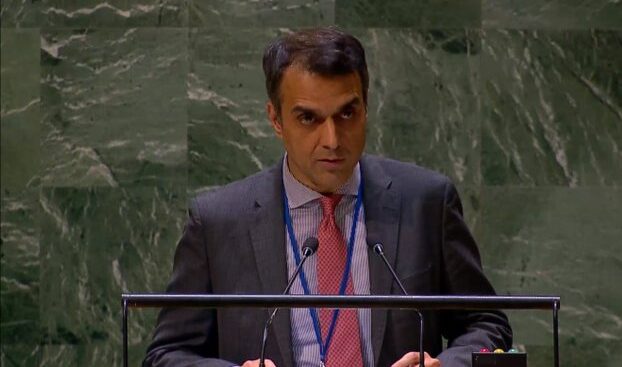UNITED NATIONS, : Pakistan has called for the removal of “undue restrictions” on providing to developing countries access to new and emerging technologies to enable them to make progress in order to address contemporary challenges. “We underscore the imperative of removing barriers for gaining equitable and non-discriminatory access to scientific knowledge, equipment, material and technology, including its transfer to developing nations,” Ambassador Usman Jadoon, deputy permanent representative of Pakistan to the United Nations, told UN Security Council’s “Arria-Formula” meeting on ‘Unlocking the Potential of Science for Peace and Security.’
Switzerland convened the 15-member Council meeting under the format of Arria formula, which is named after a former Venezuelan UN ambassador, Diego Arriva. It is a very informal consultation process which affords the Council the opportunity to hear persons in a confidential, informal setting. “Unless fair and equitable access to new and emerging technologies is provided to developing countries, and all undue restrictions removed, the Global South will lag even further behind in achieving the Sustainable Development Goals (SDGs),” Ambassador Jadoon added. Opening the meeting, Thomas Gurber, State Secretary of the Federal Department of Foreign Affairs of the Swiss Confederation, said that the 15-member Council has a mandate to deal with the many crises that are shaking the world. But, he said, even in these difficult times, it was crucial that the world community took a longer-term view,’ noting that the number of conflicts was increasing and the challenges to peace and security becoming ever more complex. “The consequences of climate change are exacerbating existing risks, new technologies are having a profound impact on our societies and disinformation is threatening trust between states,” the top Swiss official added. In his remarks, Ambassador Jadoon said that Pakistan recognizes the transformative potential of science in advancing peace and security. “Scientific knowledge and tools also enable us to anticipate threats more effectively,” the Pakistani envoy said, pointing out that climate modeling, disease surveillance systems, and early warning mechanisms have demonstrated the power of scientific data in informing proactive responses. At the same time, he said, modern science and technologies have also led to the advent of new tools of warfare – moving from sticks and stones to gun powder to nuclear weapons and cyber warfare. “The use of Artificial Intelligence (AI) enabled autonomous weapons is poised to be the new revolution in military affairs.” “Today,” Ambassador Jadoon warned that the convergence of AI and information warfare – marked by the exponential proliferation of disinformation through online platforms and social media – was also being used to wage “hybrid warfare” for fomenting social discord and spreading propaganda leading to discrimination, hate speech, stigmatization, racism, xenophobia and Islamophobia. In this regard, he reiterated Pakistan’s concerns about the unregulated military applications of emerging technologies and supported calls for establishing legally-binding norms to regulate their use, ensuring regional and global stability. In conclusion, he reaffirmed Pakistan’s commitment to unlocking the potential of science for peace and progress, advocating for responsible scientific practices and international cooperation to build a safer and more prosperous future.



Comments are closed.